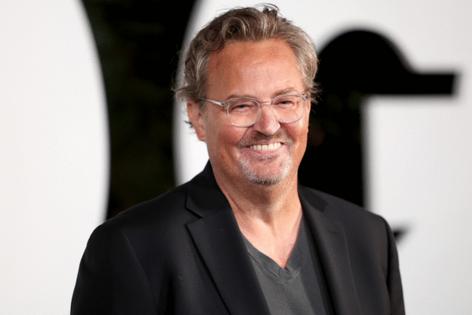Matthew Perry's doctor agrees to plead guilty to distributing ketamine to actor before his death
Published in News & Features
LOS ANGELES — A physician charged in connection with Matthew Perry’s death has agreed to plead guilty to distributing ketamine to the Friends’ star, according to a plea agreement filed Monday.
Dr. Salvador Plasencia, known as Dr. P., was one of five people charged last year stemming from the investigation into Perry’s October death. Plasencia faces up to 40 years in prison for the four counts of distribution of ketamine.
Plasencia had previously been facing a variety of charges, including altering and falsifying documents or records related to the federal investigation.
Plasencia’s attorney did not immediately respond to a request for comment.
Three other defendants pleaded guilty last year in connection with Perry’s death, including Dr. Mark Chavez; Kenneth Iwamasa, who was Perry’s live-in personal assistant; and alleged drug dealer Erik Fleming.
The fifth defendant, Jasveen Sangha, aka the “Ketamine Queen,” has pleaded not guilty.
Perry, 54, was found dead in the hot tub of his Pacific Palisades home on Oct. 28. He died from“acute effects of ketamine,” according to the Los Angeles County Medical Examiner’s Office.
Plasencia was accused of acquiring the ketamine for Perry and acting outside the scope of professional practice. Authorities say he not only distributed the drug that killed Perry, he also taught Iwamasa how to inject it into the actor. Iwamasa is accused of giving Perry the fatal dose.
Perry, who had long been open about his challenges with drug and alcohol addiction, had sought treatment for depression and anxiety before his death, going to a local clinic where he became addicted to intravenous ketamine, DEA Administrator Anne Milgram said. When clinic doctors refused to increase his dosage, he turned to outside sources, Milgram said.
In late September, about a month before Perry’s death, Plasencia learned the actor was interested in obtaining ketamine, a legal medication commonly used as an anesthetic, according to the indictment. The drug can be abused recreationally, with users drawn to it for its dissociative effects.
After learning of Perry’s interest, Plasencia contacted Chavez, who had previously operated a ketamine clinic, to obtain the drug to sell to the actor, authorities said. In text messages to Chavez, Plasencia discussed how much to charge Perry for the ketamine, stating, “I wonder how much this moron will pay” and “Lets find out,” according to the indictment.
Plasencia also wrote in messages to Chavez saying he didn’t want Perry to “look elsewhere” for his ketamine supply. According to the indictment, Plasencia wrote that he wanted to be “his go to.”
In the weeks that followed, the doctors distributed 20 vials of ketamine to Perry for $55,000 in cash, charging him $2,000 for a vial that cost Chavez $12, according to federal prosecutors and court records.
Federal prosecutors allege Plasencia taught Iwamasa how to inject Perry with ketamine, sold the assistant the drug and left vials of it for Iwamasa to inject into the actor. At one point, a large dose caused Perry to “freeze up,” prosecutors said The doctor is also accused of injecting Perry with the drug inside a car in a Long Beach parking lot.
“Matthew Perry’s journey began with unscrupulous doctors who abused their position of trust because they saw him as a payday and it ended with street dealers who sold him ketamine in unmarked vials,” U.S. Drug Enforcement Administration Administrator Anne Milgram said during a news conference last year.
“The desperation that led Perry to these individuals was not met with help, as it should have been from the doctors,” she said, “but instead it was met with exploitation.”
Court records show that, by mid-October, Iwamasa also began obtaining ketamine for Perry from Sangha and Hollywood producer Erik Fleming, who provided the drug at a lower cost than the doctors were charging. Sangha sold about 50 vials of the drug to the actor, with Fleming delivering the product, for $11,000, authorities said.
After Perry’s death, Plasencia was accused of giving officials falsified documents showing a medical treatment plan for Perry that claimed he was being given a maximum dose of 60 milligrams over 24 hours. In fact, prosecutors say, Perry was injecting far higher doses.
Fleming pleaded guilty to one count of conspiracy to distribute ketamine and one count of distribution of ketamine resulting in death.
Iwamasa, 59, pleaded guilty to a count of conspiracy to distribute ketamine causing death. He also admitted injecting Perry with ketamine without medical training, including performing several injections on the actor the day he died, authorities said.
©2025 Los Angeles Times. Visit at latimes.com. Distributed by Tribune Content Agency, LLC.







Comments